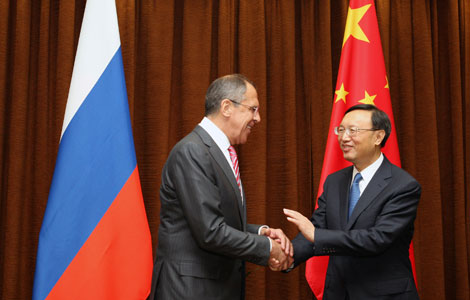|
 |
|
Foreign Minister Yang Jiechi meets his Russian counterpart Sergei Lavrov on Thursday. Lavrov is in Beijing to attend a meeting of foreign ministers of the Shanghai Cooperation Organization. [Photo / China Daily] |
The frequent high-level exchanges will further facilitate China-Russia ties in politics, the economy and culture, said Russian Foreign Minister Sergei Lavrov.
Lavrov started his visit to China on Thursday to make preparations for newly-elected President Vladimir Putin's upcoming trip to China, and attend a meeting of foreign ministers of the Shanghai Cooperation Organization.
Foreign Minister Yang Jiechi called for more coordination between the two countries to enhance development and regional stability.
Both sides agreed to raise the quality of cooperation in the fields of trade, direct investment, energy, high-tech, and especially, strategic large projects, according to Yang.
"I believe that Russia's development and China-Russia ties will keep a good momentum under the new leadership of Putin," Yang said.
In 2011, bilateral trade volume between China and Russia reached about $80 billion, a 42.7 percent year-on-year increase. The number is expected to hit $100 billion in 2015 and $200 billion in 2020, a target set by both Chinese and Russian leaders.
Russia, a large energy exporter, has largely recovered from the global recession, and the country's economy has greatly benefited from increases in the price of oil, Qu Xing, director of the China Institute of International Studies, told Chinese media.
Sergei Minenko, general representative of Irkutsk regional government of Russia in China, said China-Russia relations will continue to develop in a stable manner since Putin's and Medvedev's strategy has not changed.
"Their political directions are consistent," Minenko said.
Due to Putin's desire for a powerful country and the overlapping interests between China and Russia, Putin will continue his friendly diplomacy to China, just as he had stated before the election, Pan Lide, a Russian studies expert with the Chinese Academy of Social Sciences, told Chinese media earlier.
There's great potential for bilateral cooperation in anti-drug trafficking, counter-terrorism and energy development in the Far East region, Pan said.
Lavrov also stressed the importance of mutual understanding between the people of the two countries. Lavrov on Thursday morning spoke at an opening ceremony for the museum of liberation of northeastern China from Japanese invaders in 1945 in Dalian of northeast China's Liaoning province.
The brotherhood, like the one shared by the Chinese and Russian peoples during the World War II, could lay a solid foundation for closer bilateral ties, Lavrov said.
Contact the writers at [email protected] and [email protected]
